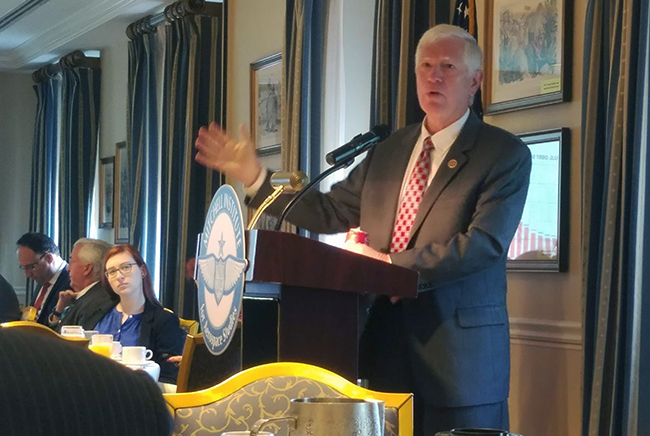
Rep. Mo Brooks (R-Ala.) discussed the future of missile defense funding at an AFA Mitchell Institute breakfast on July 12, 2019, in Washington, D.C. Staff photo by Rachel S. Cohen.
House Armed Services Committee member Rep. Mo Brooks (R-Ala.) said he expects the Missile Defense Agency and the new Space Development Agency will learn to manage complementary—and possibly duplicative—research programs as they pursue missile-tracking sensors in space.
“How exactly the development of the space sensor layer will be divvied up between MDA and the Space Development Agency will likely be finalized during the National Defense Authorization Act conference process, but I have confidence that the two agencies ultimately will work together and get this done,” Brooks said at a July 12 AFA Mitchell Institute breakfast on Capitol Hill.
The Trump administration’s recent Missile Defense Review touted the potential of a space-based sensor and interceptors to detect hypersonic weapons when they launch and track them continuously throughout flight. SDA is taking on that challenge as part of its effort to build an array of hundreds of small satellites near Earth, which some see as stepping on the toes of other work underway in the Defense Department. Supporters say SDA will move faster and pursue unique ideas compared to the more traditional acquisition processes in MDA.
Pointing out potential duplication of effort, the Senate Armed Services Committee wants to shrink 2020 funding for defense-wide space technology development and prototyping from $85 million to $55 million. Both agencies are expected to prototype hypersonic and ballistic missile tracking sensors, though former SDA Director Fred Kennedy has argued SDA can make progress toward an operational system before MDA puts its own sensors on orbit in 2025.
For SDA to make a difference in missile defense, it needs to try more out-of-the-box ideas like nanosatellites and help drive lower system production and launch costs, according to Tom Karako, who directs the Missile Defense Project at the Center for Strategic and International Studies.
Brooks is unhappy with how the House’s version of the 2020 NDAA treats missile defense funding, which the White House also criticized in a July 9 statement of administration policy.
“The administration strongly objects to the $413 million in reductions to the [MDA] funding request as well as the rescoping of Flight Test Mission-44 during a period of escalating threats to the homeland and our allies,” according to the statement. “Specifically, the administration objects to the $150 million reduction to the Improved Homeland Defense Interceptor Program (Redesigned Kill Vehicle). The reduction would be premature pending the result of DOD’s analysis of alternative courses of action for the Redesigned Kill Vehicle effort and could cause even further delays to the delivery of 20 additional Ground-Based Interceptors.”
The congressman also warned US security will suffer if the federal government does not take steps to shrink its historically large federal debt, which now exceeds $22 trillion. He supports amending the US Constitution to require the federal government to balance its budget each year.
“If we’re not financially responsible, we’re going to go through that debilitating insolvency and bankruptcy,” Brooks said. “In my judgment, it would be the worst error in American history with the possible exception of the Civil War. There’s no guarantee that when we’re in a weakened state, that one of our geopolitical foes won’t think that they can take advantage of us and actually beat us.”